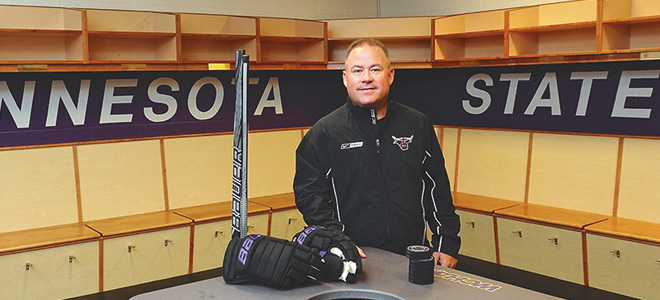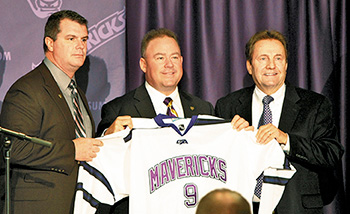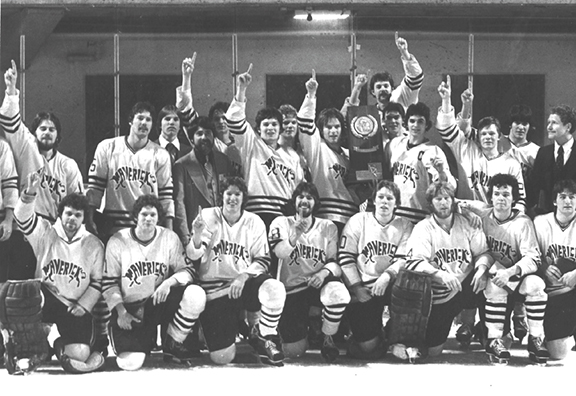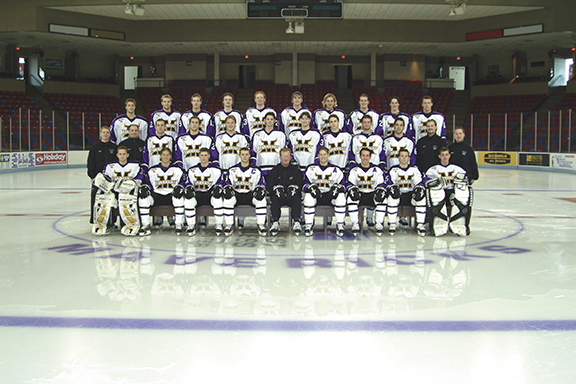 There comes a time when a hockey player, skating with the puck through the neutral zone, has to make a difficult decision: Should he fire the puck into the corner and battle to get it back? Should he head off the ice for a line change? Or should he keep the puck on his stick, carry it across the blue line, try to beat the defender and attack the net?
There comes a time when a hockey player, skating with the puck through the neutral zone, has to make a difficult decision: Should he fire the puck into the corner and battle to get it back? Should he head off the ice for a line change? Or should he keep the puck on his stick, carry it across the blue line, try to beat the defender and attack the net?
Minnesota State University, Mankato faced such a dilemma when it came to the future of its men’s hockey program during the 2011-12 season—a season that began and ended with uncertainty for the Mavericks.
During the previous summer, several college hockey conferences—including the prestigious Western Collegiate Hockey Association, which Minnesota State Mankato has belonged to since 1999—began breaking up, with plans to reform and rebuild prior to the 2013-14 season. After the shakeup, Minnesota State Mankato remained in a barely recognizable WCHA.
On the ice, meanwhile, the Mavericks limped to a second-straight 11th-place finish in the 12-team WCHA. Attendance at the Verizon Wireless Center in downtown Mankato dropped significantly, as did overall fan interest in and booster support for Minnesota State Mankato hockey, as the year went on.
Dump and chase? Go to the bench for a breather? Attack the net?
Minnesota State Mankato opted to go for a goal.
“We’re going to do what it takes to be a force in hockey,” University President Richard Davenport says. “We are committed to that.”
Charismatic Coach
In April, Minnesota State Mankato showed off its aggressive new style of play by hiring Mike Hastings as the Mavericks’ new coach.
Hastings had been the associate head coach at the University of Nebraska Omaha for the previous three seasons but was also well established as a head coach in the junior ranks. It was only a matter of time before a college team would come calling for him to take its reins, and Minnesota State Mankato got to him first.
“This charismatic coach is just outstanding,” Davenport says. “This guy is a winner. He loves winning. And he instills that value and that drive in players.”
The 46-year-old Hastings has learned from and worked with some of the best coaches in college hockey. In 1986, the Crookston, Minn., native began playing college hockey at St. Cloud State under the legendary Herb Brooks, who coached the University of Minnesota to three national championships in the 1970s and was the architect of the “Miracle on Ice,” the United States Olympic Team’s upset over the Soviet Union and run to the gold medal in Lake Placid, N.Y., in 1980.
Over the last four years, Hastings has worked as an assistant to Don Lucia at Minnesota and Dean Blais at Nebraska Omaha, both of whom have won national championships—Lucia twice with the Gophers and Blais twice with North Dakota.
“I’ve been fortunate enough to be around some pretty special people,” Hastings says.
Hastings has accomplished some pretty special things himself. He was the coach and general manager of the Omaha Lancers of the United States Hockey League, a junior-level league that develops and prepares an abundance of players—and coaches—for college and professional hockey. Among the USHL alumni on Minnesota State Mankato’s current team are standouts Eriah Hayes, Jean-Paul LaFontaine and Zach Palmquist, among others.
In 14 seasons with the Lancers, Hastings never had a losing record. His teams went 529- 210-56 with three USHL titles and two national championships. He was named the league’s Coach of the Year twice and General Manager of the Year five times. If there was any doubt about how that community felt about Hastings and his accomplishments, in 2009 Hastings was named to the Omaha Hockey Hall of Fame.
“He’s got something that’s indefinable, that causes his players to win games,” Davenport says. “I like his approach. He’s not a neophyte. He’s a very experienced, seasoned coach who has high standards, which I think match and parallel the high standards of the University. It was a very easy decision to hire him.”
One of the Mavericks’ captains this season, defenseman Tyler Elbrecht, played for Hastings’s last Lancers team and is looking forward to reuniting with his old coach.
“He’s going to be a good fit for this team,” Elbrecht says. “He knows how to push guys to the limit and be the best they can.”

The press conference where Director of Athletics Kevin Buisman (left) and President Davenport (right) introduced Coach Hastings (center).
Hastings hit the ground running, going out on the recruiting trail the night he was hired. Over the spring and summer months, he proved to be the man Davenport and Director of Athletics Kevin Buisman thought he would be when they hired him. “I think he’s incredibly committed, passionate and extremely hard-working,” Buisman says. “He’s anxious to get out there on the ice with the student-athletes. He’s been a champion for the program and the community. He’s doing good work out there for the program.”
During his introductory press conference on April 16, Hastings said expectations “are going to be special” for hockey. Davenport echoed that, saying that the hockey team and other athletics are the “window to the University.”
“We definitely need to have a winning record, a winning team,” Davenport says. “We need to be among the top teams in our conference consistently. And we need to get in the NCAA tournament. We need to regain our fan base. …
“I’m not going to be happy if we’re not winning.”
Required Resources
Winning requires Minnesota State Mankato to put more resources into hockey, Davenport says. Some of that will be directed at the wish list that Hastings developed when asked what the program needs to recruit top players and win games.
One of Hastings’s requests was for better facilities. The University was already in the process of assisting in the city of Mankato’s push for upgrades to the Verizon Wireless Center. Plans have been drawn up to make the downtown arena the Mavericks’ permanent, everyday home—not just their game rink—in the future and be a significant improvement from the practice facilities at All Seasons Arena a few blocks from campus. The Verizon Wireless Center would be home to the women’s hockey team as well.
“I have seen a commitment,” Hastings says. “I know the commitment is there from the top down. It’s never waivered. I have the utmost confidence in the University’s commitment to excellence. There are a lot of layers that encompasses.”
Conference Conundrum
With the massive changes coming to college hockey and the WCHA next year, it might have been easy for Minnesota State Mankato to take a more conservative approach with its program—to dump the puck deep and then sit back and play defense.
In the summer of 2011, Minnesota State Mankato was among a group of programs left behind by an exodus of some of the top teams in the WCHA, as well as some of the Mavericks’ biggest rivals.
The Big Ten announced it would be adding hockey as a conference sport, taking Minnesota and Wisconsin from the WCHA. Davenport said that scenario had been under discussion for a long time and didn’t come as a surprise to him when it happened.
The shocker came when North Dakota, Denver, Colorado College, Minnesota Duluth and Nebraska Omaha announced that they would also be leaving to start a new super conference with Miami (Ohio) of the Central Collegiate Hockey Association. Named the National Collegiate Hockey Conference, the league later added St. Cloud State, a sixth WCHA member, and Western Michigan to its league.
Suddenly, the WCHA had gone from one of the most tradition-rich conferences in college hockey, one with 37 national championships to its name, to a league on the brink. With Davenport in a new leadership role in the WCHA, the league eventually invited the remaining CCHA schools to join, and they accepted. In 2013, Minnesota State Mankato will be in a WCHA with current members Bemidji State, Alaska Anchorage and Michigan Tech, as well as Northern Michigan, Lake Superior State, Ferris State, Bowling Green and Alaska (Fairbanks).
“I just didn’t want to see the WCHA deteriorate,” says Davenport, the chair of the President’s Council for the league. “I think we have a bit of a climb as we restore our reputation and legacy. I think we need to step up to the plate as a conference and be competitive and disprove any myths that we’re a weaker conference.”
Hastings has bought in, too.
“Really, we want to take the lead,” he says.
Where some saw big problems on the horizon, Minnesota State Mankato sees an opportunity. Hastings, Davenport, Buisman and many others at Minnesota State Mankato believe the Mavericks can be the best team in the revamped conference. Winning regularly could mean regular trips to the NCAA tournament, something the Mavericks have done just once since upgrading to Division I and joining the WCHA. “I think we’re going to be more competitive than we ever have been,” Davenport says.
Taking the program’s entire history into account, that prediction could mean great expectations.

The 1979-80 team after winning the NCAA Division II National Championship under head coach Don Brose.
Minnesota State has had hockey since the 1969-70 season, when Don Brose started the program. The first teams played outdoors and used old football jerseys for uniforms. But within 10 years, Brose and the Mavericks were celebrating an NCAA Division II national championship.
Eventually, the University decided to upgrade to Division I and applied to join the prestigious Western Collegiate Hockey Association. The Mavericks began WCHA play in 2000, and after a surprising fourth-place finish that first season, Brose was named the league Coach of the Year. Having taken the program out of nothing to participate in the best college-hockey conference in the country, Brose retired after 30 years and more than 500 victories. The coaching reins were handed to his longtime assistant, Troy Jutting.
Jutting, a former Mavericks player, had success, too. He was twice named WCHA Coach of the Year and took the Mavericks to the NCAA tournament after the 2002-03 season. Jutting coached for 12 seasons (22, including 10 years as an assistant) before he was reassigned to a new role as special assistant to Davenport last April; he then accepted an assistant coaching position at Nebraska Omaha.

The 2002-03 team that earned a berth to the Division I NCAA tournament under head coach Troy Jutting.
Hastings is just the third coach in program history.
“This was a year to step back and take a look at our hockey program in general, to dissect it and look at what we need to do to keep it alive,” Davenport says. “A new, fresh face, a new approach and a new attitude sometimes gives you a chance to back up and start over again fresh. Not to take away from our previous coach.”
Hockey is the only Division I sport at Minnesota State Mankato; the rest play at the Division II level. Because of that caliber and the extra attention that goes with it, improvement and sustained success are vital. A winning team, the president says, will reflect well on the University as a whole and fits in with the overall short- and long-term vision of the University.
“There is kind of a crescendo,” Davenport says, “an echo that occurs that when you’re good, everybody knows you’re good. And guess what? Everyone wants to be part of a winner.”
Shane Frederick has covered the Mavericks hockey team for The Free Press since 2000.
Speak Your Mind